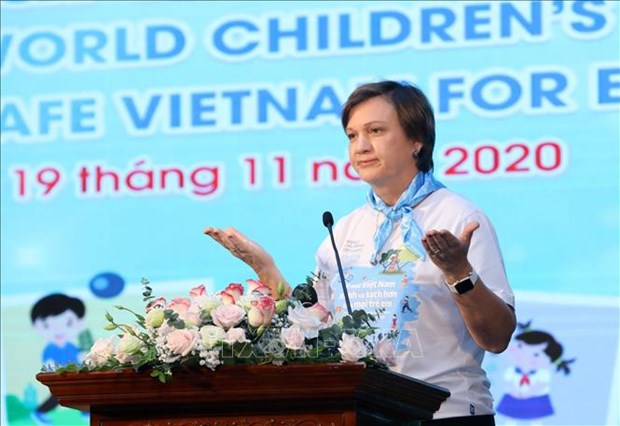Ethnic women, children most vulnerable group in Vietnam SDG indicators: Survey
Ethnic minority women and children, especially the Mong and Khmer, are the most vulnerable group in terms of the United Nations' sustainable development goals, Rana Flowers, UNICEF Representative in Vietnam, said at a workshop held on December 8 to announce findings from a survey measuring Vietnam Sustainable Development Goal indicators on Children and Women (SDGCW) 2020-2021.
 UNICEF Representative in Vietnam Rana Flowers (Photo: VNA)
UNICEF Representative in Vietnam Rana Flowers (Photo: VNA) Hanoi (VNA) – Ethnic minority women and
children, especially the Mong and Khmer, are the most vulnerable group in terms
of the United Nations' sustainable development goals, Rana Flowers, UNICEF
Representative in Vietnam, said at a workshop held on December 8 to announce findings
from a survey measuring Vietnam Sustainable Development Goal indicators on
Children and Women (SDGCW) 2020-2021.
While reporting key findings of the survey at the workshop, Flowers mentioned a lack of internet access and IT skills among people across the country. The survey showed that although more than 80 percent of people aged 15-49 use the Internet, only over 30 percent of them know how to use computers.
She also pointed out the popular practice of punishing children at home by means of violence and a clean water crisis facing Vietnam.
The survey was conducted by the General Statistics Office (GSO) in collaboration with concerned government ministries and agencies. It is part of the Global Multiple Indicator Cluster Survey (MICS) Programme of the United Nations Children’s Fund (UNICEF), 6th Round, or MICS6, which for the first time integrated selected modules from the Demographic and Health Survey. Technical and financial oversight and support was provided by UNICEF, while the United Nations Population Fund (UNFPA) contributed technical and some financial support to extend the areas addressed in the survey.
The Vietnam SDGCW survey 2020-2021 generated data for 169 indicators, of which 35 are national SDG indicators, making it a key source of data for monitoring the country’s progress towards achieving the SDGs and its national targets.
In her opening speech, GSO General Director Nguyen Thi Huong said it is the biggest MICS in Vietnam and the world to date, with 14,000 households in 700 areas across all 63 provinces and cities of the country participating in. The samples represent six economic regions and two major cities – Hanoi and Ho Chi Minh City – as well as major ethnic minority groups.
Huong noted the findings reflect the real life of children and women in Vietnam regarding reproductive health, child nutrition, education, health, equal access to information and communication technology, inclusive development, early labour, child disability, among other indicators.
She said the information will support the establishment of programmes and policies, especially those focusing on disadvantaged children and women such as ethnic minorities living in disadvantaged areas, poor households and people with disabilities./.
While reporting key findings of the survey at the workshop, Flowers mentioned a lack of internet access and IT skills among people across the country. The survey showed that although more than 80 percent of people aged 15-49 use the Internet, only over 30 percent of them know how to use computers.
She also pointed out the popular practice of punishing children at home by means of violence and a clean water crisis facing Vietnam.
The survey was conducted by the General Statistics Office (GSO) in collaboration with concerned government ministries and agencies. It is part of the Global Multiple Indicator Cluster Survey (MICS) Programme of the United Nations Children’s Fund (UNICEF), 6th Round, or MICS6, which for the first time integrated selected modules from the Demographic and Health Survey. Technical and financial oversight and support was provided by UNICEF, while the United Nations Population Fund (UNFPA) contributed technical and some financial support to extend the areas addressed in the survey.
The Vietnam SDGCW survey 2020-2021 generated data for 169 indicators, of which 35 are national SDG indicators, making it a key source of data for monitoring the country’s progress towards achieving the SDGs and its national targets.
In her opening speech, GSO General Director Nguyen Thi Huong said it is the biggest MICS in Vietnam and the world to date, with 14,000 households in 700 areas across all 63 provinces and cities of the country participating in. The samples represent six economic regions and two major cities – Hanoi and Ho Chi Minh City – as well as major ethnic minority groups.
Huong noted the findings reflect the real life of children and women in Vietnam regarding reproductive health, child nutrition, education, health, equal access to information and communication technology, inclusive development, early labour, child disability, among other indicators.
She said the information will support the establishment of programmes and policies, especially those focusing on disadvantaged children and women such as ethnic minorities living in disadvantaged areas, poor households and people with disabilities./.













